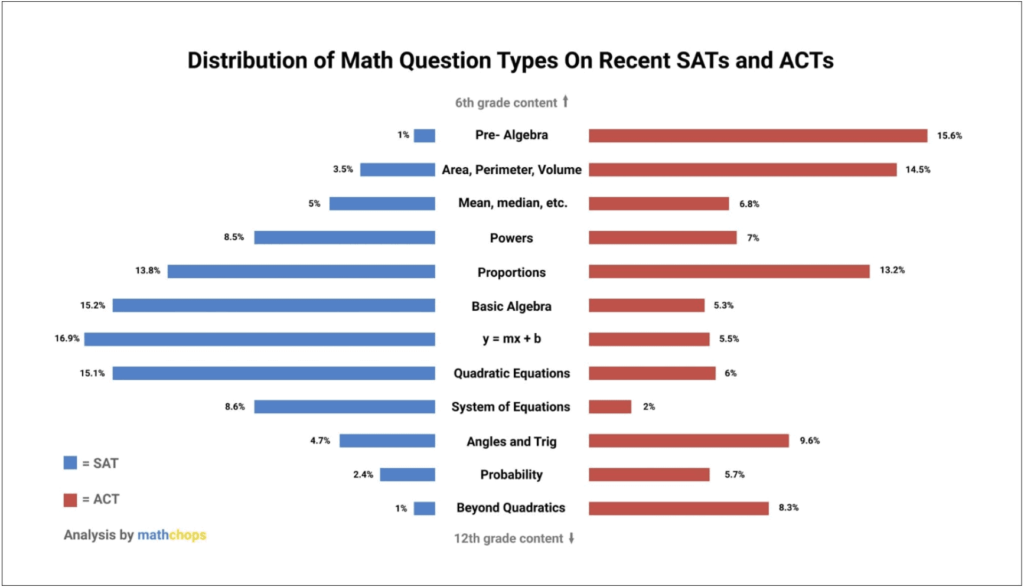
The Difference Between SAT And ACT
One of the questions parents frequently ask is whether students should take the SAT or ACT. I always respond that in order to make an informed decision, parents should learn the differences between the two tests, and consider their student’s academic strengths and personal circumstances. The following information will help:
How Are the SAT and ACT Different?
The truth is that the tests are very similar, and both provide an excellent assessment of reading, writing, math, and critical thinking. The verbal sections are also similar — they even copy each other’s tricks and traps — so much so that preparing for them on one test will help with the other.
The main differences to keep in mind are:
- Speed is the key challenge on the ACT. On the SAT, it’s critical thinking. When the new digital SAT rolls out in the U.S. in March 2024, vocabulary will become a key challenge as well.
- ACT math requires mastery of more concepts from pre-algebra, geometry, trigonometry, and algebra II, while the majority of SAT math comes from a single year (algebra I represents 56% of the math questions, as shown in the analysis below).
- ACT math allows students to use a calculator throughout, while the SAT has both a calculator and non-calculator section until March 2024.
- The ACT science section is unique to the ACT and does not have a comparable component on the SAT.
- There are two different scoring systems (ACT: 1 to 36; SAT: 400 to 1600), but you can compare scores using the official score conversion table. Because there are fewer possible scores on the ACT, and because scores are rounded up, it’s easier to get a perfect score on the ACT. (This can be useful in various circumstances, such as earning a full-ride at University of Alabama through the Presidential Elite scholarship.) On the other hand, a perfect score on the SAT is rarer, and therefore more impressive.
- Because the ACT is created and administered by the ACT, and the SAT is created and administered by the College Board, there are different websites for registering.
- If you want to see the questions you missed, the SAT has an invaluable Question and Answer Service (QAS) that is available for the October, March, and May tests. Avoid paying for the Student Answer Service (SAS) on other dates because it provides vague guidance. The ACT has a similar service called the Test Information Release (TIR), available for the December, April, and June tests.

How Are the SAT and ACT Different?
You can raise both ACT and SAT scores with practice and effort. However, it is quicker and easier to raise SAT scores because there’s less material to review. More than half of SAT math is taken from algebra I — a single year’s curriculum. ACT math, on the other hand, tests more concepts from pre-algebra, geometry, trigonometry, and algebra II (see the analysis shown below). Furthermore, the ACT contains a unique science section.
The need to master additional math and science makes preparation for the ACT significantly more time-consuming and labor-intensive than the SAT. However, ACT questions tend to be straightforward, while the SAT tends to require a good amount of analysis and creativity. Therefore, students who invest an unusually large amount of time will continue to make ACT score improvements, while those preparing for the SAT may hit a plateau in which score increases are more difficult.
Because the least coachable section of the test — Reading Comprehension — is being essentially eliminated in March 2024, the SAT will become a much easier test to raise scores for most students. The new challenge will be advanced vocabulary, which is straightforward to improve using apps such as Anki, which is free on most platforms.
Is the SAT Better for Admissions?
About 85% of students who take both tests have no statistical difference in their scores according to the official score conversion table (and that statistic is likely understated because of the effect of random variation). However, a recent analysis claimed that colleges tend to admit students who submit SAT scores at a higher rate than those who submit equivalent ACT scores. More data is needed, but it is possible that students could gain an advantage from taking the SAT in terms of admissions.
When Is it More Advantageous to Take the ACT Than the SAT?
The ACT is preferable for a student who:
- Has a relatively high ACT science score. Because the unique element of the ACT is its science section, those who do much better on that section will have a higher overall score. (Be aware that there is very little scientific knowledge tested; it is more of a test of simple data analysis).
- Was granted extra time due to a medical diagnosis. Because time pressure is the key challenge on the ACT, extra time can be more advantageous on the ACT than it is on the SAT.
- Already has a high ACT score. Because of the advantage of superscoring, it’s often far easier to raise an already-high ACT score by concentrating on a specific section than to start from scratch with the SAT. An increase on any of the four ACT sections will improve the superscore, while a decrease will not result in any loss.
Overall, it can be a good idea to take both tests and see which results in a better score. However, for those who prefer not to invest in the six hours of test taking, I recommend that the student stick with one, get serious about preparation, and put in the effort to do as well as possible.